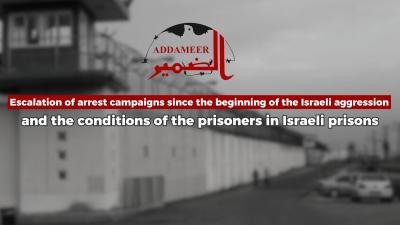
Since the beginning of the Israeli aggression, more than 850 Palestinians have been arrested until today. Among them are a number of released prisoners, children, women, journalists, and members of the legislative council. The arrest campaigns were accompanied by raids on homes, searching, and destruction of personal property, as well as attacking and abusing family members, all within the framework of seeking revenge against the Palestinian people.
As for the occupied territories 1948, the numbers of detainees remain unknown up to this moment. The Israeli occupation forces have arrested number of Palestinians, including activists, lawyers, nurses, doctors, and artists, on charges of incitement and assisting the enemy during the war.
The anti-terrorism Law was also amended, and included not only participating in and writing publications, but also extensive monitoring of news published on social media platforms affiliated with a "terrorist organization". Additionally, number of cases were observed where students were expelled from their universities due to their posts on social media.
Regarding the detainees from the Gaza Strip, their number has reached approximately 900. The Israeli Minister of Security issued an order considering Palestinian detainees from Gaza as "unlawful combatants" based on the "Unlawful Combatants Law" issued in 2002. Article 3(A-B) of the order confirms that detainees from the Gaza Strip are to be held in a camp called "Sdeh Teiman," which is military camp near (Beer AlSabe’). Another group of detainees (approximately 50 detainees) have had their detention extended for the purpose of interrogation, and they will be tried under the anti-terrorism law, which allows the detainees to be denied access to their lawyer for up to 21 days.
Regarding the conditions inside Israeli occupation prisons, since 7/10/2023, the Israeli Prison Services “IPS” began implementing retaliatory measures against the prisoners. All communication with the prisons was cut off. The “IPS” closed sections, confiscated television sets, deprived prisoners of visits, in addition to cutting off electricity in several prisons and restricting water to only one hour per day. Moreover, there were raids on several prisons and attacks on prisoners. Some prisoners were transferred and isolated. The Damoun prison, where female prisoners are held, was also raided, and the representative of the female prisoners, Marah Bakir, was isolated in Jalameh Prison.
The “IPS” also closed the canteen and limited the prisoners to receiving only two very poor-quality meals a day. They also shut down the prison clinics, and also prevented prisoners from going to hospitals and external clinics, despite the presence of some cancer patients among the prisoners who require continuous treatment. These measures hinder their access to necessary medical care.
In addition, family visits have been completely banned, and lawyers were initially prohibited from visiting the prisons in the first week. Now, lawyers face restrictions in their work that prevent them from visiting regularly.
The attorney general had agreed to the proposal to allow overcrowding in prisons, and the Knesset approved an amendment to the Prison Service orders allowing prisoners to sleep on mattresses on the floor in cases of overcrowding.
ADDAMEER calls on the International Committee of the Red Cross (ICRC) to abide by its responsibilities as the authorized international organization to monitor the situation of Palestinian detainees and visit them in the newly established military camps.
ADDAMEER also urges the (ICRC) to inform the detainees families of their place and the conditions of their detention, in addition to demanding visits to prisons to assess the condition of the prisoners after the violations they have endured.